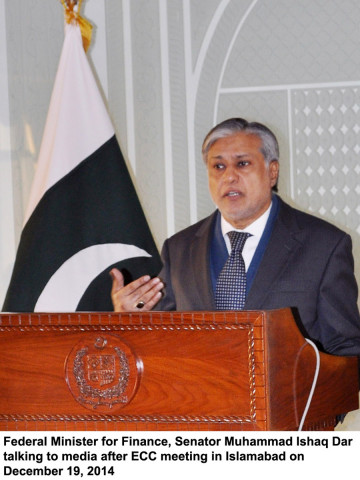10-year low SBP cuts discount rate to 8.5%
Dar jumps the gun on bank announcement, casting doubts on central bank independence

Finance Minister Ishaq Dar. PHOTO: PID
Stripping away even the veneer of autonomy from the State Bank of Pakistan, Finance Minister Ishaq Dar announced on Saturday that the central bank has brought down the benchmark discount rate to 8.5%, down 100 basis points since November, and its lowest level since April 2005.
Hours before the formal monetary policy announcement by SBP Governor Ashraf Wathra, Dar told a news conference in Islamabad that the SBP central board of directors had decided to reduce the discount rate by 100 basis points.
Reviewed every two months, it is the interest rate at which commercial banks are allowed to borrow from the central bank’s discount window on an overnight basis. Central banks use this monetary policy tool to control money supply in the economy in order to achieve price stability and economic growth targets.
Most analysts polled by The Express Tribune had anticipated a rate cut of 50 basis points in view of contained inflation and declining trade deficit during the last two months. They expected the SBP to opt for ‘cautious monetary easing’ by reducing the discount rate in two installments of 50 basis points each. (A basis point is one-hundredth of one per cent).

However, the SBP cut the discount rate by 1% on the back of improved economic indicators. Saying that the containment of fiscal deficit bodes well for the “credibility of consistent and coherent policies of the government,” the SBP said the first half of the current fiscal year ended on a better macroeconomic outlook for the remaining months of fiscal 2015.
After keeping the discount rate flat at 10% from November 2013 to November 2014, the SBP had decreased it by 50 basis points to 9.5% at its last monetary policy announcement.
Low inflation expectations
Inflation is hovering around its lowest level since 2014. The Consumer Price Index (CPI) inflation clocked up at just above 6.1% during the first half of fiscal 2015, which is significantly lower than the CPI of 8.9% for the same six months of the preceding fiscal year.
Central banks tend to increase the discount rate, also referred to as monetary tightening, when inflation is on the rise. Conversely, they lean towards monetary easing by lowering the discount rate if the CPI is down in order to boost credit off-take in the economy.
Speaking on the inflation outlook, Wathra said the SBP has revised downwards its forecast range for the average CPI inflation to 4.5%-5.5% for fiscal 2015. The new estimate is significantly lower than the initial annual target of 8% inflation for the current year.
Balance of payments
The SBP believes the favourable impact of record-low oil prices in the international market on the country’s trade balance has contributed towards improving the external sector outlook in recent months.
Referring to the receipt of $1.1 billion from the IMF, Wathra said these developments have supported the SBP in its reserve-building efforts and remained instrumental in improving sentiments in the foreign exchange market.
Issuing a note of caution, however, the SBP governor said the non-realisation of planned privatisation proceeds and lack of private inflows could pose risks to a sustainable balance of payment position.
Highlighting the miniscule net private direct and portfolio investments (1.8% of GDP) by the end of fiscal 2014 and declining exports, the SBP governor said implementing reforms should be the top priority for the government. “While securing the GSP Plus status is definitely encouraging, to fully exploit its benefits there should be programmes and plans for product diversification in exports as well,” he said.
While noting that fiscal deficit has stayed contained so far in fiscal 2015, the SBP warned that the overall expenditures could increase going forward because of higher security-related expenditures.
According to Topline Securities CEO Mohammed Sohail, the rate cut will help sustain the ongoing bull run on the stock market despite foreign selling during the last seven weeks.
Published in The Express Tribune, January 25th, 2015.


















COMMENTS
Comments are moderated and generally will be posted if they are on-topic and not abusive.
For more information, please see our Comments FAQ